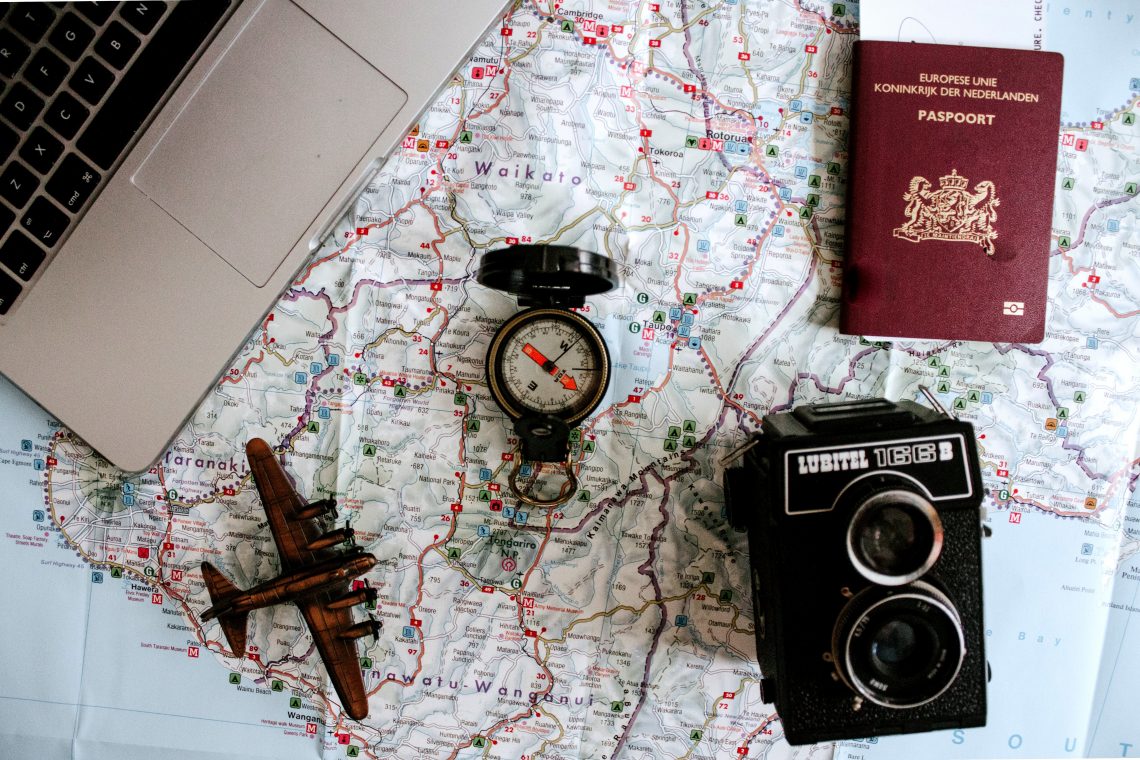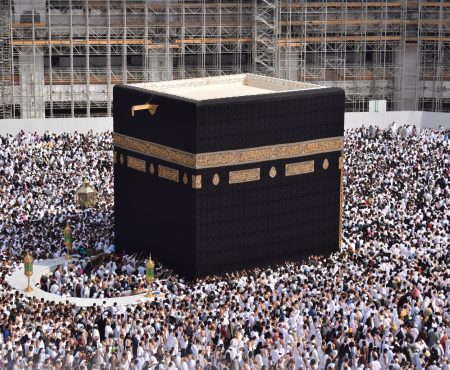Born in the port town of Tangier, Morocco in 1304, Shams al-Din Abu Abdullah Muhammad ibn Abdullah al-Lawati al-Tanji ibn Battuta was a devout Muslim scholar and traveler, known for his extensive travels during the medieval period covering most of the Islamic empire and beyond. Ibn Battuta spent 30 years traveling the world and is recognized as one of the greatest travelers in history. He is also the author of the Rihlah (Travels), one of the most famous books on travel. His book is an account of his journey and experiences throughout the world, covering 75,000 miles (120,000 km), and offering a unique look into Islamic and medieval history from a cultural perspective.
Ibn Battuta was a devout Muslim, born into a family of Muslim judges. He began studying traditional education and law at a young age and had memorized the Qur’an, reciting it in its entirety twice a day, at times, during his journey. Due to the lack of madrasas, or colleges of higher education, in his hometown, his urge to travel would increase in order to gain better access to the best teachers and libraries, which at the time were located in modern day Egypt, Syria, and Arabia. More importantly, his desire to complete the Hajj, or pilgrimage to the holy city of Mecca, which is required of all Muslims at least once in their lifetime, was enough reason for him to begin traveling.
Finally, on June 14, 1325, at the young age of 21, Ibn Battuta would begin his journey to Mecca, leaving Tangier on his donkey. On beginning his journey he writes:
“I set out alone, having neither fellow-traveler in whose companionship I might find cheer, nor caravan whose part I might join, but swayed by an overmastering impulse within me and a desire long-cherished in my bosom to visit these illustrious sanctuaries. So I braced my resolution to quit my dear ones, female and male, and forsook my home as birds forsake their nests. My parents being yet in the bonds of life, it weighed sorely upon me to part from them, and both they and I were afflicted with sorrow at this separation.”
Unlike Marco Polo, Ibn Battuta started his journey alone and did not seem to have any desire to continue his quest beyond the pilgrimage to Mecca and pursuing higher education. While traveling through North Africa and entering the city of Tunis, his feelings of loneliness seemed to peak:
“Townsfolk came forward on all sides with greetings and questions to one another. But not a soul said a word of greeting to me, since there was none of them that I knew. I felt so sad at heart on account of my loneliness that I could not restrain the tears that started to my eyes and wept bitterly.”
This feeling would not last long as he was comforted by a fellow pilgrim who would go on to introduce him to other educated peers, and even found lodging for him at a local college. By the time he left the city, he was working as a paid judge for a caravan of pilgrims who needed a well-educated man to settle their disputes. Traveling with a caravan would become a regular habit for Ibn Battuta which offered many advantages to him, mainly safety against people with ill intentions. Ibn Battuta would also receive various forms of alms from people he encountered during his travels to assist him in his journey including gold, clothing, and other supplies as the act of giving alms is considered a pillar in Islam.
After leaving Tunis, his next destination was Alexandria, Egypt. While there, Ibn Battuta spent three days as a guest of a devout mystic by the name of Burhan al-Din. Burhan al-Din who noticed Ibn Battuta’s passion for travel, suggested that he visit three of his fellow mystics whom he called his brothers in modern day Pakistan, India, and China, noting that he will enjoy their hospitality. On his encounter with Burhan al-Din, Ibn Battuta wrote:
“I was amazed at his [Burhan al-Din’s] prediction, and the idea of going to these countries having been cast into my mind, my wanderings never ceased until I had met these three that he named and conveyed his greeting to them.”
During his time in Alexandria, Ibn Battuta would visit another devout mystic by the name of Sheikh al-Murshidi during the summer. While staying with the Sheikh, Ibn Battuta who would sleep on the roof of the Sheikh’s residence dreamed one night that a large bird carried him all the way to Mecca and further, to lands he had never imagined before. The Sheikh interpreted his dream to mean that he will make it to Mecca, and that his travels will take him even further.
The two experiences would cause Ibn Battuta to develop a newfound passion for travel, reconsidering his original plan of returning to his hometown following his pilgrimage to Mecca. He decided that he would travel for its own sake, visiting as many countries as possible, learning about new nations and people, and observing a rule “never to travel any road a second time.”
Unable to reach Mecca by sea, Ibn Battuta would go through Palestine and Syria before finally entering Mecca for the first time in the fall of 1326, 16 months after leaving Tangier. His stay in Mecca lasted a month as he completed all of the rituals, while networking with Muslims from different parts of the world. His trip to Mecca would not be his last, as he would complete the pilgrimage for a total of four times throughout his lifetime. When the pilgrimage was over, Ibn Battuta decided to join a caravan of returning pilgrims headed for Baghdad instead of going home. This would mark the beginning of his globetrotting adventures.
The next three decades of Ibn Battuta’s life would be spent traveling the world. His trip to Iraq was followed by a visit to Iran and a return back to Mecca and Medina where he would stay for two years. After leaving Mecca, he would then head south to Yemen, setting sail to the east African coast, navigating as far south as Tanzania. He would then return to southern Arabia, making stops in Oman and southern Persia before heading back to Mecca again in 1332. He then decided to head north in order to visit Turkey and the Crimean Peninsula.
Ibn Battuta then headed east towards India, taking complicated routes to include Iran, Uzbekistan, Afghanistan, and the Hindu Kush Mountains, facing harsh climate and rough terrain along the way. By the time he reached India, he was already a well-known person with a decent following of people that travelled along with him. His stay in India lasted about two years where he worked as a judge for the Sultan of Delhi. After leaving India, his next stop was the Maldives where he worked as a judge for a year and a half, before traveling through Sri Lanka, Bangladesh, and India in order to reach China.
Arriving in the city of Quanzhou, China in 1345, Ibn Battuta would go on to stay in the country for over a year, going as far as Beijing and Guangzhou. He then, decided to head back to the Arabian Peninsula making a stop in Sumatra along the way.
Eventually, Ibn Battuta decided to pay a visit back home, only to be a told by a messenger along the way that his parents had passed away. Rather than continue on home, he went on to visit the empire of Granada in modern day Spain before returning back to Africa. Once back in Africa he would head to Sudan and back west across the Sahara into the empire of Mali and the city of Timbuktu, staying in the area for about a year.
Finally in late 1353, Ibn Battuta would return and settle back home in Morocco. At the request of the Merinid sultan, he would then dictate the accounts of his travels to a writer who would record the stories in a book named the Rihlah (Travels). The rest of his life would be spent working as a judge in Morocco before passing away around 1368-1369.
Ibn Battuta traveled over 40 countries during his lifetime stretching from West Africa and Spain all the way to China and Southeast Asia. During his journey he would meet over 60 rulers and a vast number of governors, ministers, and dignitaries along the way. Due to his vast knowledge and expertise in Islamic law, Ibn Battuta would often serve as a judge in various locations along his journey. The hospitality of Muslims along with the various gifts and alms he received from them were a key factor in his survival throughout his travels. Although Ibn Battuta faced many dangers and tragedies along the way including losing all of his property and gifts on several occasions, barely surviving attacks, and losing his parents, his passion never diminished and he never gave up on his journey.
His journey, highlighted in the book the Rihlah (Travels), was a great contributing factor to historians’ understanding of the medieval period, particularly in the Islamic world. Ibn Battuta’s accounts offered unique observations of the countries he visited, the people he meet, and the conditions prevalent during that time period, shedding light on many details from a social, cultural, political, economic, and historical standpoint.
His legacy lives on.






Tous les commentaires (0)